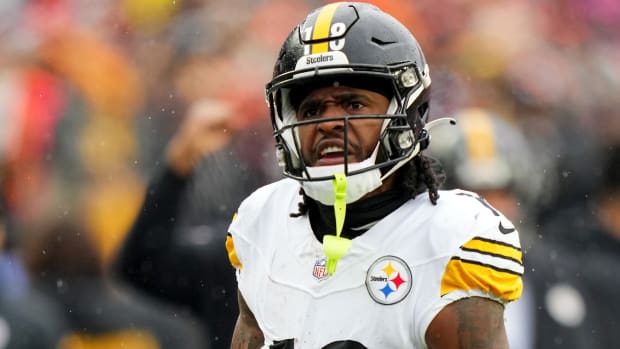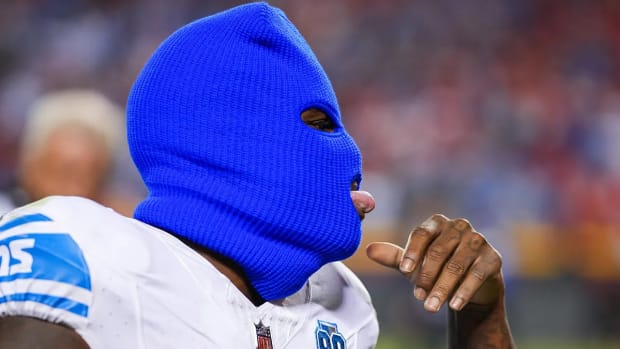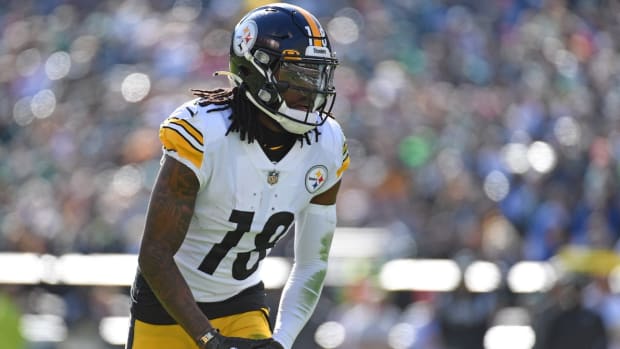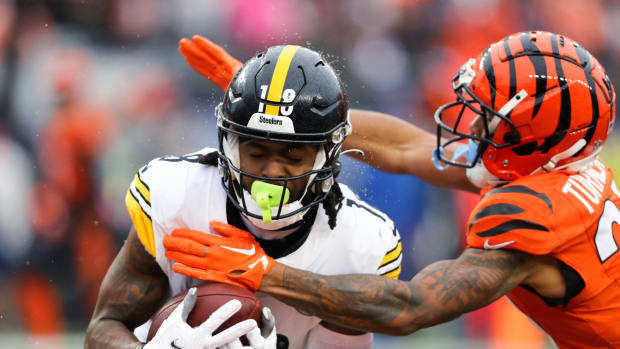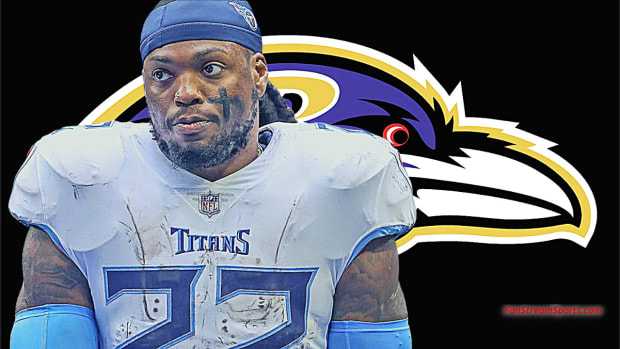Game of Throws: Inside the World of Quarterback Competitions
So you like conflict? You crave deception and double-speak and plot twists and . . . heck, there are only so many more episodes of Game of Thrones remaining.
Consider as an alternative, then, the NFL, where we’re staring down at least five cutthroat training-camp quarterback battles in August, including in parts of the country where postseason ambitions are openly discussed in September. In Cleveland, coach Hue Jackson told reporters that Cody Kessler deserves “the chance to walk out there first” at camp ahead of Brock Osweiler and rookie DeShone Kizer—but Kizer already has observers talking about upheaval at the position. In White Sulphur Springs, W.Va., where Houston is holding camp, Bill O’Brien has simultaneously gushed about Tom Savage’s “really good training camp” and about Deshaun Watson’s being “way ahead of” any rookie QB he’s ever seen. In New York, the Jets are still figuring out whether they can put 2016 second-round pick Christian Hackenberg on the field ahead of Bryce Petty and veteran Josh McCown. In Denver, Vance Joseph has said it’d be “ideal” to decide between Trevor Siemian and Paxton Lynch by Week 3 of the preseason. And in Chicago, where everyone says veteran Mike Glennon will be the Week 1 starter, Mitch Trubisky, the second pick in the ’17 draft, is proving that he’s already got the hang of this Game of Thrones thing. “Mike’s the starter,” says Trubisky, future face of the franchise, “and I’m behind him all the way.” Mhm.

Browns 2007: Frye (9) broke the Browns' single-game rookie passer-rating record in 2006. Anderson was a sixth-round pick waived by the Ravens in 2005 but led a comeback in K.C. for Cleveland a year later. Quinn was a first-round pick from Notre Dame.
Tony Dejak/AP
To gain some insight into what actually happens in the throes of a training camp battle, Sports Illustrated spoke with 10 former and current quarterbacks, ranging from Heisman-winning first-round picks (the anointed) to undrafted players (the annoying), from Super Bowl winners to spot starters. If there’s one theme that emerged, it’s this: There’s no right way to hold a QB competition.
KURT WARNER, who won Super Bowl XXXIV with the Rams in 2000 but found himself in competition with ’06 first-round pick Matt Leinart at Cardinals camp in ’07 and ’08: When you’re a veteran who’s played and had success, one thing you assume is that you’ll have the upper hand from the standpoint of the system or understanding how to play the game.
RODNEY PEETE, who started eight games for the Lions in 1989, only to see Detroit draft Heisman winner Andre Ware in ’90: Andre and I did not have a great relationship because he came in very entitled, like he was going to step in and be the starter, take all the reps, just because he was drafted in the first round. I was like, Hooold on, fella. There was tension and animosity.
WARE: Well, I don’t know if I had any expectations. You’re drafted and you expect to come in and at least be given an opportunity.
Jay Cutler Is Miami’s Present, and the Future Just Got Interesting
JAKE DELHOMME, who in 2003 signed with the Panthers, with whom Peete had landed and won seven games the year prior: I was the young kid [28] and I was going to be given a chance at some point. That’s kind of how it was always portrayed to me.
PEETE: I’m sure [Jake] was looking at it like, Rodney’s 37 years old and he won’t be here long, so it will eventually be my team. That’s how you analyze where you go. But he didn’t come in with any attitude of, I’m trying to take over.
DELHOMME: I can’t really say it was a competition where, Oh gosh, I’m trying to beat him out. We got along very well, to be quite honest.

Bills 1998-2000: Johnson (11) was initially named the starter after Buffalo traded the Jaguars first- and fourth-round picks to get him and awarding him a $25 million contract. Flutie, who had last played in the NFL in 1990 before becoming a CFL star, was signed to a $300,000 deal before the '98 season.
Andy Lyons/Getty Images; Ezra Shaw/Getty Images
Others, not so much.
DOUG FLUTIE, who in 1998 signed with the Bills straight out of the CFL, and then battled three straight camps with Rob Johnson, who arrived from Jacksonville in exchange for first- and fourth-round draft picks: When I signed it was, Well, I’ll have a chance to compete for the starting job. Weeks later Rob signs for big money. Mine was a very minimal contract, so the writing was on the wall. That’s when the goal kind of shifted to, I just hope I make the team.
JOHNSON: When Doug signed it was kind of a joke, to be honest—no offense to Doug. No one in the NFL really thought much of it. Until I got hurt [in Week 1] and he got his chance and played well, it wasn’t really thought of that seriously. [Flutie won Comeback Player of the Year that season and then signed a four-year $22 million extension.] When they signed Doug to a big deal, I was like, All right, I’m out. I was over it.
FLUTIE: [In 1999], I had a legitimate contract now, but I honestly don’t recall any friction at that point. He probably hoped he’d be the guy to play.
JOHNSON: My stats [in 1998] were better than his, but his win-loss record was better than mine. It was the perfect storm. He was the underdog; I was a prototypical quarterback with size. He had the autistic son he did commercials with—that pulled at people’s heartstrings; I was the surfer boy from California. A local radio station had this skit where they used a high-pitched voice for Doug, I guess because he was short, and I sounded like Spicoli from Fast Times at Ridgemont High. It was hilarious. That’s how people thought of it.
FLUTIE: I know fans have a tendency to root for the little guy or the underdog. That may have been all that was. I don’t know how his relationship with the fans was. I just went out and played.

Cardinals 2006-09: Warner (13) was a 33-year-old ex-Super Bowl champion when he arrived in Arizona. Leinart was an ex-Heisman winner chosen 10th overall in 2006, and had a $51 million contract.
John W. McDonough
As Flutie, Johnson and many others have come to realize: Whatever you’re told the day you sign, that isn’t always the reality when you get to camp.
MARK BRUNELL, who was traded to the Redskins in 2004, only to battle with—and eventually lose his job to—Patrick Ramsey: [Washington coach] Joe Gibbs didn’t bring me in to be the backup. I was much more accomplished than Patrick, who was considerably younger than me. I was going to be the starter. I don’t think there was any question about that.
JOSH JOHNSON, who was drafted by the Buccaneers in 2008 and then spent four straight summers competing for first-team reps in camp: I was told [entering ’09] that I was going to be competing for a starting job. There’s a difference between what’s going on and what you’re told sometimes—I got a feel for that fairly quickly when the reps got split up and I was barely getting any.
DELHOMME: The first week of training camp [in 2003], and even in OTAs, reps were split evenly with the ones, twos, threes and fours. Not many teams do that. If you have 20 plays per period, the starter usually gets 10 or 12, the backup gets four or five. . . . With [coach John] Fox, it was five-five-five-five.
PEETE: When you’re an older player, quarterback or not, you’re O.K. splitting reps in training camp because you’re saving your body. [Aside from reps], I was treated as the No. 1.
WARNER: That [2007 Cardinals] training camp was extremely frustrating as they bounced us in and out and gave us different reps. Matt held the starter’s reps for the most part, but in my mind there was no question: I was the better quarterback in everything we were doing. It was an extremely frustrating camp because I was told the best guy was going to play, and I had the bar set against me already.
WARE: I can’t remember how the reps were divvied up [with Rodney], but it was never like we were competing to see who won the job. There were a lot of dynamics in terms of who had drafted me, who’d left and who remained in the front office. All of those components play into a competition.
PEETE: [In 1993, after three years of losing out to me], Andre was more animated about getting his shot. We went to London to play a preseason game [against the Cowboys], and we were warming up, stretching. I’d been named the starter going into camp, and I’d started the first exhibition game. [Offensive coordinator] Dan Henning comes up to me and goes, “Uh, Andre’s talked to the owner, and he’s going to start the game today.” This is like 20 minutes before kickoff. And I guess because we were in London I let it roll off my shoulders. But I was pissed off.
WARE: I’ve never wanted anything given to me other than a fair opportunity to compete on a level playing field—not because you’ve coached a guy’s dad or because this guy’s dad is in the NFL or whatever the circumstances were. When I played, I think I did a fair enough job to warrant being given an opportunity to start.

Washington 2004-05: Ramsey was a Steve Spurrier pick who had started the previous two seasons. Brunell, Jacksonville's all-time leading passer, was a 33-year-old free-agent signee.
Larry French/Getty Images
Even when coaches try splitting camp reps right down the middle, that’s not always the perfect solution.
BRUNELL: I didn’t like [splitting repetitions]. In 2004, I felt like I didn’t have enough reps to get ready for the season. You need to have time with the starting receivers and the offensive line while learning a new system, and going back and forth between ones and twos was frustrating to me. I went into the season not feeling prepared at all.
CHARLIE FRYE, who in 2007 battled for reps in Browns camp with Derek Anderson and Brady Quinn, a first-round pick that spring: Me and Derek would rotate daily who went with the ones. They worked Brady in [when he ended his rookie-contract holdout]—he’d take the threes and then he’d take some of the ones from whoever’s day it was. It’s really hard to get three guys ready to be the starter.
ANDERSON: It wasn’t really split evenly . . . because you can’t really split it evenly. It’s hard.
FRYE: Before one preseason game, Derek and [Browns coach] Romeo Crennel and I were at the stadium right before pregame, just us three, and [Crennel] said, “Heads or tails?” I think D.A. called it. That’s how the starter at the first preseason game was decided.
ANDERSON: It was odd. But [Crennel] was such a good dude, and I honestly don’t think he knew where to go with it at the time. There were outside things intervening with the whole process. Different people had different opinions on who should play, and I don’t think it was ultimately his decision.

Lions 1990-93: Peete (9) was a sixth-round pick in 1989 and went 3-5 as a rookie fill-in. Ware was the seventh overall pick of the 1990 draft, hand-picked by GM Jerry Vainisi.
Focus On Sport/Getty Images; Berstein Associates/Getty Images
Even when one QB wins out in camp—or just wins a coin flip—a regular-season game or two can undo a summer’s worth of competition.
BRUNELL: If you’re not winning games, the quarterback’s the first one to go, which I understand. It came as no surprise [when I was pulled halfway through the 2004 season after dealing with a hamstring problem]; I probably would have benched me too. But you’ve got to have some time practicing in the system. For most guys it takes a year to get comfortable. We just didn’t have that in camp.
ROB JOHNSON: [In 1999] I saw the writing on the wall, saw how it looked, and I knew it wasn’t an open competition. It was never open for me to win that camp. I thought it was, because [coach Wade Phillips] said so, but it really wasn’t.
FLUTIE: Actually, [1998] wasn’t an open competition. Rob was the starter. But once I started playing, then I felt like it was an open competition, a fair shake. I knew Rob was irritated with the situation and I tried to keep my mouth shut and focus on playing football.
ROB JOHNSON: I’m a coach’s son and I’m a pleaser, so I wasn’t making any waves or doing anything behind people’s backs. [Johnson won his job back in camp in 2000 and went on to start 11 games.]
NFL Training Camp Quarterback Battles: Siemian or Lynch? Savage or Watson?
PEETE: You can kind of get a sense of what a team or a coach is thinking along the way. There was a very conscious effort [in 2003] to get Delhomme a lot of reps in camp and in preseason games, which leads you to believe they had their minds made up about what they were going to do the moment things didn’t go well for me. [Peete was benched midway through the opener in favor of Delhomme, who took the Panthers to Super Bowl XXXVIII that year.]
DELHOMME: [That competition] was as straight-up as possible. That’s one thing about John Fox: He has no hidden agenda. Then you had Henning—he and Rodney had a history together. And Mike McCoy was our quarterbacks coach; he’d backed up Rodney at QB in Philly.
WARNER: You can’t be naive to the business of the NFL. You hear over and over again the best player is going to play; I got to the NFL and that was my belief. And then you realize that’s not the case. Sometimes it gets personal. Sometimes it’s money driven. Sometimes it’s about a draft pick. There were times I wanted to scream, times I thought about retiring because I was like, This doesn’t make sense!
WARE: Would I have loved to have gotten the keys to the car for even a half-season, and then let’s see where we go from there? Absolutely. But you can’t twist someone’s arm and force those things to happen. [Ware never started more than three games in a season for Detroit. He didn’t appear in an NFL game after 1993.]
ANDERSON: Weird things kind of played out, but everything shook out the way it probably should have. [Anderson was named QB2 after the third exhibition game in 2007, but he took over halfway through Week 1 and played every remaining game in what would be a Pro Bowl season.]
FRYE: I think the earlier you can decide who your starter is, the better for the team—they’ll know who to rally around. It’s also better for those individuals who are going through the competition. It takes a toll on you emotionally, mentally. [Frye was traded to Seattle after Week 1.]
JOSH JOHNSON: In camp [in 2009] I went from fourth on the depth chart to second. Three weeks later I went from second to starting. [Johnson went 0–4 as a starter, then was benched.] I wasn’t the first quarterback to be put in that situation, and I won’t be the last. Would I say I got a fair shot? No. But it was an NFL shot.
• Question or comment? Email us at talkback@themmqb.com.
































